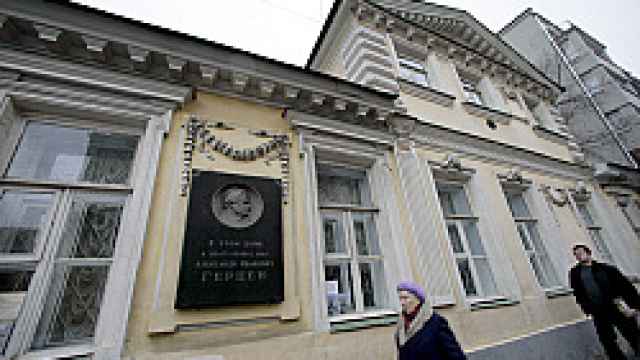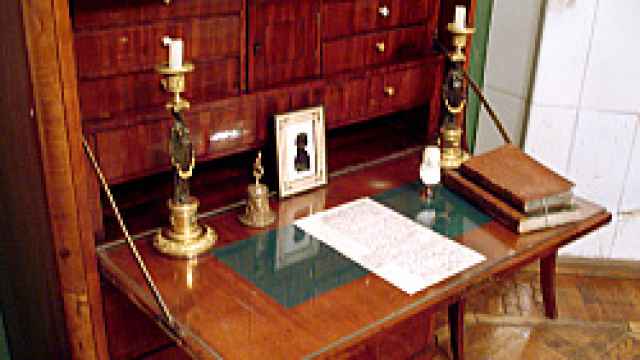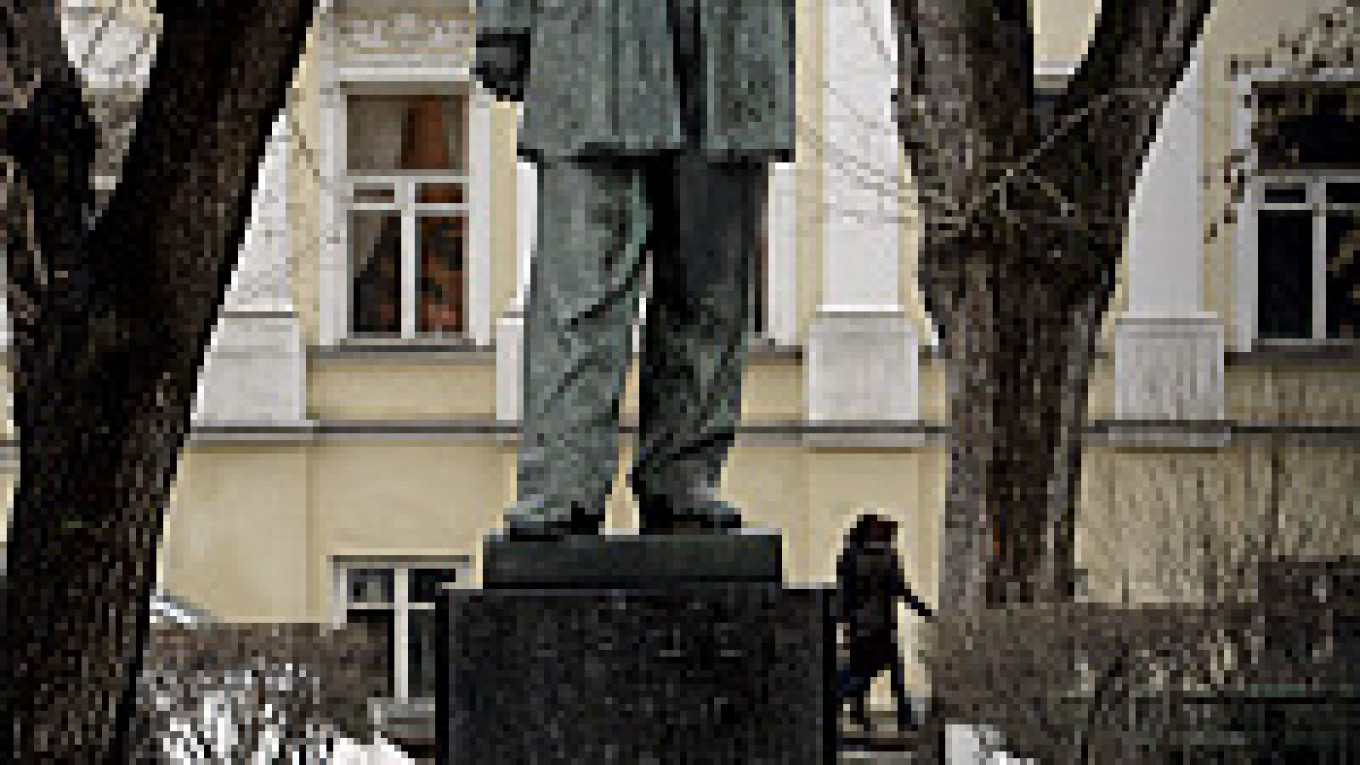Before Stoppard's plays, which premiered in London in 2002, Herzen's name brought only blank stares from most Westerners. The plays follow the lives of Herzen and his circle in Russia and Europe in the middle of the 19th century but are by no means an exhaustive treatment of Herzen's life. A quick tour, however, of places in Moscow connected with this enigmatic thinker and writer can help to fill in the blanks.
The Alexander Herzen House Museum, which opened in 1979, is located on Sivtsev Vrazhek Pereulok, in the house where Herzen lived from 1843 to 1847. After Herzen's death in 1870, his belongings were divided among his family members, who lived all over the world, said Yelena Narskaya, the senior researcher at the museum.
"His great-granddaughter, Natalya Petrovna, collected many of the artifacts for the museum from relatives in Switzerland and in the United States," Narskaya said.
All of the exhibits are donations from Herzen's descendents, many of whom come to visit when in Moscow. Stoppard has also visited the museum, Narskaya said.
 Igor Tabakov / MT The Alexander Herzen House Museum, on Pereulok Sivtsev Vrazhek, is in the house where Herzen lived from 1843 to 1847. | |
The museum is a treasure trove of objects connected not only with Herzen's personal life, but also with his friends and acquaintances in the Moscow intellectual circles of the 1830s and 1840s. There is a small glass inscribed with "Shushka," the name he was called in his childhood; a copy of Nikolai Ge's portrait of Herzen by the writer's daughter Natalya hangs near the entrance; and the original writing desk from Herzen's study is covered with several original letters and diary extracts.
Herzen was not only a socialist thinker, but a writer of some repute. Outside the Gorky Literature Institute on Tverskoi Bulvar stands a granite statue of Herzen erected in 1959. According to one Moscow State University alumni web site, students have the tradition of kissing what is tactfully described as a spot "just below his lower back" in order to bring, if not a Nobel Prize, then at least acclaim and good earnings.
From his plinth in the small garden outside the institute, Herzen surveys the busy traffic on the boulevard, once one of the most popular spots for Russian nobility to take an evening walk and now a hive of post-Soviet, Western-style building activity. The positioning of the statue is certainly striking, given Herzen's lifelong attempts to reconcile Western notions of individual freedom with what he saw as the innate socialism of the Russian people.
 James Marson / For MT Herzen's original writing desk, with some of his original letters and diary extracts. | |
"They were two very different men," said Narskaya. "But Marx actually learned his Russian from reading 'My Past and Thoughts.'"
If the prominence of the monument appears surprising because of this disagreement with the founding father of communism, this can be explained by the memorial to Herzen and his best friend Nikolai Ogaryov on Sparrow Hills.
In 1825, at the age of 13, Herzen and Ogaryov made an oath, in memory of the Decembrist rebels who were executed that year, to fight against autocracy in Russia. This led none other than Lenin to claim, almost 100 years later, that Herzen was not only the first Russian socialist, but also a direct ancestor of the Bolsheviks who raised the flag of revolution. The act on Sparrow Hills was interpreted as a symbolic inheritance of the torch of revolution, and Lenin's phrase "the Decembrists woke Herzen" became a standard of school lessons in Bolshevik history.
This high praise from Lenin explains the prominence of these two Soviet-era monuments in honor of Herzen, and it also goes some way to explaining the desolate state into which the one on Sparrow Hills had fallen since the collapse of the Soviet Union. But in 2006, the monument was cleaned up by Stoppard, with the help of some members of the Russian Academic Youth Theater cast from his play and some students from Moscow State University.
Jewish-Russian poet Naum Korzhavin, who himself attended the Gorky Literature Institute, wrote these bitter lines about Lenin's phrase: "The Decembrists woke Herzen. ... But which bitch woke Lenin? ... Oh, Decembrists! Don't wake Herzen! One shouldn't wake anything in Russia."
Stoppard's plays might begin the process of extricating Herzen from the ruins of Bolshevik ideology, to which his legacy never really belonged, but which, interestingly, secured his place on the Moscow cityscape.
"Herzen isn't read enough," said Narskaya. "I don't know if we can say that Stoppard has awoken Herzen, but I saw lots of young people at the plays, which is an encouraging sign."
Contacts
Herzen House Museum (Dom-Muzei A.I. Gertsena), 27 Per. Sivtsev Vrazhek, 241-5859. Entry costs 50 rubles, with discounts for school children, students and pensioners.
Russian Academic Youth Theater (Rossiisky Akademichesky Molodyozhny Teatr), 2 Teatralnaya Ploshchad, 692-0069, M. Okhotny Ryad, ramt.ru
A Message from The Moscow Times:
Dear readers,
We are facing unprecedented challenges. Russia's Prosecutor General's Office has designated The Moscow Times as an "undesirable" organization, criminalizing our work and putting our staff at risk of prosecution. This follows our earlier unjust labeling as a "foreign agent."
These actions are direct attempts to silence independent journalism in Russia. The authorities claim our work "discredits the decisions of the Russian leadership." We see things differently: we strive to provide accurate, unbiased reporting on Russia.
We, the journalists of The Moscow Times, refuse to be silenced. But to continue our work, we need your help.
Your support, no matter how small, makes a world of difference. If you can, please support us monthly starting from just $2. It's quick to set up, and every contribution makes a significant impact.
By supporting The Moscow Times, you're defending open, independent journalism in the face of repression. Thank you for standing with us.
Remind me later.


